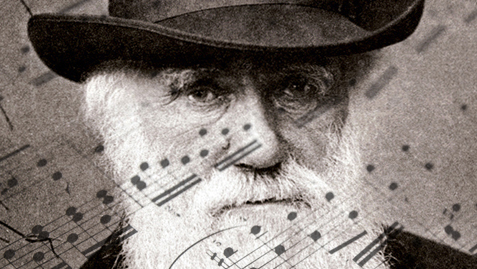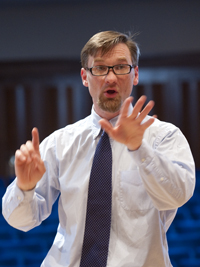

Some 150 years after iconic naturalist Charles Darwin pondered the natural world’s mysteries, excerpts from his writings are now scored to be sung in a newly commissioned work, Missa Charles Darwin—a piece that melds the musical architecture of the traditional Catholic Mass with the fundamentally secular texts of Darwin.
/ Published April 15, 2011
More than 150 years after publication, Charles Darwin’s masterly writings and insights into evolution and natural selection continue to inspire not only scientists but artists as well. One Smith music professor is celebrating Darwin as he creates a new composition that sets to music texts drawn from the British naturalist’s strikingly eloquent prose.
Using the conventions of a traditional five-movement Roman Catholic Mass to revere Darwin’s body of work, Gregory Brown, Smith’s assistant director of choral activities and a composer of choral music, is collaborating with Craig Phillips, an early music specialist and member of the classical a cappella male quartet New York Polyphony, to create the piece Missa Charles Darwin. Brown is building the work in three large-scale sections and scoring it for a male vocal quartet, which will be performed by New York Polyphony.

Gregory Brown
As conceived, Missa Charles Darwin uses the writings of Darwin in substitution for the texts of the five-movement Christian Mass (Kyrie, Gloria, Credo, Sanctus and Agnus Dei) with the fundamentally secular texts of Darwin. The original composition will be premiered October 15 in a performance at Lillie Auditorium at the Marine Biological Laboratory in Woods Hole, Massachusetts, as part of a program offered through TEDxWoodsHole—an event that is organized to bring people together to share ideas that spark deep discussion.
“I hold the structure of the Mass in high regard,” says Brown, who, in addition to his musical training, studied computer science and geology as an undergraduate at Amherst College. “And to be able to marry the Darwin texts to the form makes a lot of sense to me. The texts to me represent a modern secular approach to explaining how we’ve come to be as a species.”
While informed by Darwin’s insights on evolution and on the ability of a species to adapt and survive over time, Missa Charles Darwin should not be construed as an attempt to promote an ideological agenda or to be anything but a musical composition and one that honors, as Phillips notes, the “compositional and harmonic conventions of 600 years of Mass settings.”
The official purpose of the piece, says Phillips, is “to venerate a celebrated work of human ingenuity through the application of an accepted musical form that is uniquely suited to enhance the expressive potential of language.”
Phillips has chosen and compiled the texts for Missa Charles Darwin, making selections from On the Origin of Species, The Descent of Man and Darwin’s correspondence.
In 2009 during the 200th anniversary of Darwin's birth, there was a lot written about On The Origin of Species, says Phillips, who is a bass-baritone and an active performer in the early music scene and founding member of New York Polyphony. “Over and over again, people would refer to it as ‘the most influential book since the Bible.’ That got me thinking. If it is, in fact, the most influential book since the Bible—as ‘holy’ as a secular work can be—why shouldn't it be given the same treatment artistically that inspired sacred works receive?”
However, after Phillips started selecting portions of the Darwin texts for the vocals, he says he was surprised “that the language was, in many cases, as beautiful as the texts of the Christian Mass. It was a natural fit, to use the five-movement mass setting as a ‘vehicle’ for Darwin's words.” (See sidebar.)
Phillips concedes his “familiarity with Darwin was minimal prior to embarking on this project. I understood the basic mechanics of natural selection, but like the U.S. Constitution, works by Shakespeare, the Bible and other important works, we think we know what they're all about without ever bothering to read them,” he says. “Now that I've spent time reading Darwin, I'm really taken with his enthusiasm and curiosity.”
Brown agrees. It is fitting, he says, to give tribute to the poetic and eloquent passages, which “sing” today with as much relevance and grandeur as ever and capture a Darwinian view of the evolution of life.
“We want to honor and celebrate not only Darwin’s genius but also the spirit of his scientific explorations and his inestimable contribution to the human spirit,” says Brown, “and we are doing that through music.”

















